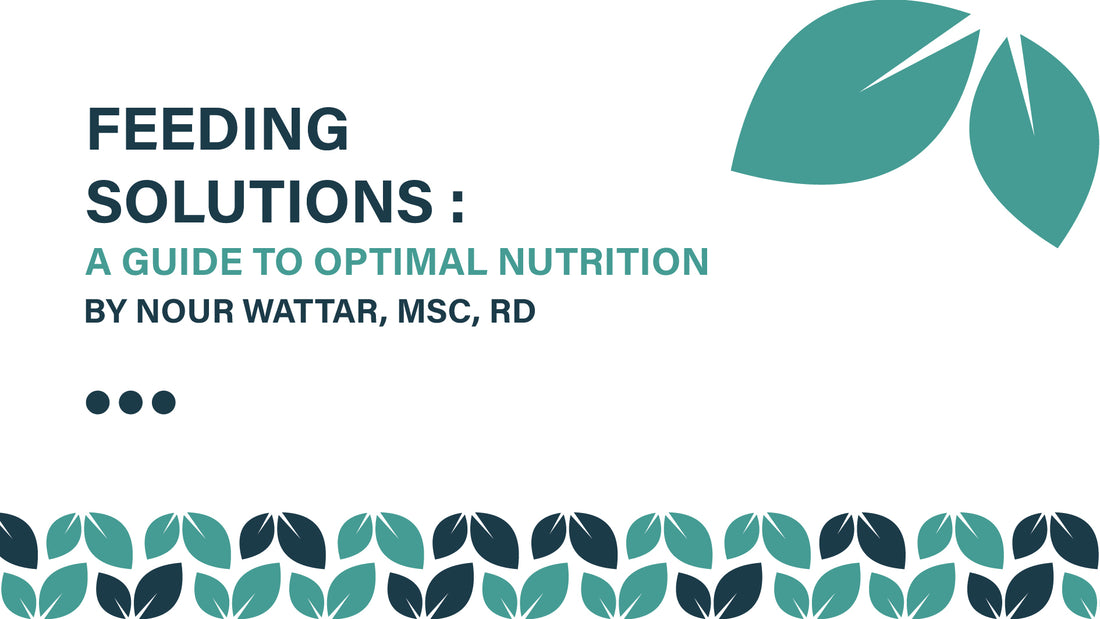
Feeding Solutions; A Guide to Optimal Nutrition
Share
Navigating the complex world of nutrition and feeding, especially amidst dietary restrictions, allergies, medical conditions, or specific health goals, can be daunting. Feeding Solutions aims to simplify this journey, offering practical solutions for balanced meals, supplements, specialized feeding methods, and the benefits of oral motor therapy tools.
Here are key considerations for optimal nutrition:
1. Embrace Nutritional Balance with Canada's Food Guide
Canada's Food Guide recommends a balanced diet as the cornerstone of good health, suggesting a plate filled with half vegetables and fruit, a quarter protein foods, and the remaining quarter whole grains. This nutrient blend is crucial for Canadians' well-being. On-the-go snacks, prioritizing vegetables, fruits, protein, and whole grains as primary ingredients, offer practical solutions for busy days.
Tips for Wholesome Meals
- Stay Hydrated: Drinking water regularly is essential for maintaining optimal health.
- Mindful Eating: Immerse yourself in the sensory experiences of your meals away from screen distractions, focusing on taste, texture, and aroma.
- Home Cooking: Unlock the benefits of preparing meals at home for healthier choices.
- Limit Processed Foods: Aim for a diet low in sodium, sugar, and saturated fat.
- Proper Seating and Positioning: Essential for optimal nutrition, enhancing digestion, ensuring safer swallowing, and improving mealtime enjoyment.
Supplements are pivotal in addressing nutritional gaps, ensuring Canadians receive all necessary nutrients, especially when environment, dietary restrictions or health conditions prevent obtaining all needed nutrients from food.
Vital Supplements for Health
- Vitamin D: Essential during fall and winter in Canada, with a recommended intake of 600-800 IU daily.
- Prenatal Vitamins: Indispensable for fetal development, blending folic acid, iron, calcium, and DHA.
- Multivitamins and Minerals: Provide support for selective eaters, aiding in nutritional balance as they explore and expand their food choices.
- Omega-3 Fatty Acids including DHA: Important for heart health, especially for those with limited fish intake.
- Vitamin B12: Crucial for vegans to support nerve function and blood cell formation.
- Calcium and Vitamin D: Key in supporting bone health, especially for older adults.
- Probiotics: Beneficial for gastrointestinal health, especially in conditions like IBS.
3. Specialized Feeding Solutions for Unique Needs
- Tube Feeding: A dietitian can offer customized nutritional solutions for those unable to meet their needs orally.
- Thickeners and Thickened Liquids: Formulated to help those with certain swallowing difficulties.
- Oral Motor Therapy Tools: Tools like Chewy Tubes and Z-Vibes, recommended by Occupational Therapists (OTs) and Speech Language Pathologists (SLPs), are instrumental in developing necessary oral motor skills for specific feeding challenges.
4. Professional Guidance Is Key
Always consult healthcare professionals for personalized advice, ensuring you're making the best choices for your health. Meeting individual needs and conditions is essential, from diet customization to selecting the right tools and supplements.
Conclusion: Embrace Your Journey to Holistic Nutrition
By exploring a range of feeding solutions- from balanced nutrition and supplements to specialized methods and tools- we can achieve optimal nourishment. Feeding Solutions is here to facilitate your health and well-being journey.
Ready to Transform Your Nutrition?
Explore our carefully selected range of products designed to meet your unique nutritional needs. Visit feedingsolutions.ca today and take the first step towards a healthier you.
By Nour Wattar, MSc, RD
Registered Dietitian Nutritionist
